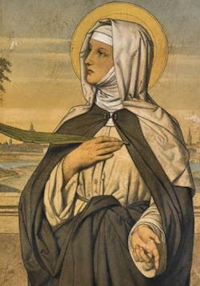Ordinary Time: July 10th
Thursday of the Fourteenth Week of Ordinary Time
Other Commemorations: St. Canute, Martyr (RM); Sts. Rufina & Secunda, Virgins and Martyrs, Religious (RM); St Amalberge of Mauberge (RM)
» Enjoy our Liturgical Seasons series of e-books!
According to the 1962 Missal of Bl. John XXIII the Extraordinary Form of the Roman Rite, today is the feast of the Seven Brothers and Sts. Rufina and Secunda. The Roman widow Felicitas and her seven sons were martyred in about the year 162. Pope Gregory the Great said of this widow, "She was more than a martyr, for seeing her seven children martyred before her eyes, she was in some sort a martyr in each of them." A century later, Rufina and Secunda, daughters of a wealthy Roman, refused to marry two suitors who had apostatized from the Christian religion. They were scourged and beheaded.
St. Canute (or Knud)
St. Canute, king of Denmark, was murdered in St. Alban's Church, Odense, July 10, 1086. The Martyrology confuses him with his nephew, St. Canute the Duke, who died on January 7, 1131, and was canonized November 8, 1169, by Pope Alexander III. St. Canute is also called Canute the holy, or Danish Knut, or Knud, Den Hellige, or Sankt Knut, or Knud.
 The son of King Sweyn II Estrithson of Denmark, Canute succeeded his brother Harold Hen as king of Denmark. Canute opposed the aristocracy and kept a close association with the church in an attempt to create a powerful and centralized monarchy.
The son of King Sweyn II Estrithson of Denmark, Canute succeeded his brother Harold Hen as king of Denmark. Canute opposed the aristocracy and kept a close association with the church in an attempt to create a powerful and centralized monarchy.
In ecclesiastical matters, Canute generously patronized several churches, including the Cathedral of Lund, Denmark's archbishopric; established a Benedictine abbey at Odense; and supported apostolic preaching throughout Denmark. In temporal matters, he attempted an administrative reform, particularly an enforced levying of tithes that incurred the wrath of the rural aristocracy. In 1085 he reasserted the Danish claims to England and, with the count of Flanders and King Olaf III of Norway, prepared a massive invasion fleet that alarmed the Norman-English king William I the Conqueror.
Canute's plan, however, had to be abandoned suddenly, for those aristocrats who opposed his tax policy revolted as he was preparing to embark for England. He fled from the rebels, led by his brother Prince Olaf, to St. Alban's Church, Odense, which he had founded, and was assassinated there with the entire royal party.
Canute was buried in St. Alban's, renamed c. 1300 St. Canute's Cathedral. Miracles were recorded at his tomb, and, at the request (1099) of King Erik III Evergood of Denmark, he was canonized (1101) by Pope Paschal II.
Patronage: Denmark
Symbols and Representation: Knight with a wreath, lance, and ciborium; Nordic king with royal insignia; dagger, lance or arrow; barefoot king with his hair in a fillet; with Saint Charles Borromeo; being murdered at the altar
Highlights and Things to Do:
- Read more about St. Canute:
- St. Canute is buried in St. Canute's Cathedral.
Sts. Rufina and Secunda
 Rufina and Secunda were sisters and virgins of Rome. Their parents had betrothed them to Armentarius and Verinus, but they refused to marry, saying that they had consecrated their virginity to Jesus Christ. They were, therefore, apprehended during the reign of the Emperors Valerian and Gallienus. When Junius, the prefect, saw he could not shake their resolution either by promises or by threats, he first ordered Rufina to be beaten with rods. While she was being scourged, Secunda thus addressed the judge: "Why do you treat my sister thus honorably, but me dishonorably? Order us both to be scourged, since we both confess Christ to be God." Enraged by these words, the judge ordered them both to be cast into a dark and fetid dungeon; immediately a bright light and a most sweet odor filled the prison. They were then shut up in a bath, the floor of which was made red-hot; but from this also they emerged unhurt. Next they were thrown into the Tiber with stones laid to their necks, but an angel saved them from the water, and they were finally beheaded ten miles out of the city on the Aurelian Way. Their bodies were buried by a matron named Plautilla, on her estate, and were afterwards translated into Rome, where they now repose in the Basilica of Constantine near the baptistery.
Rufina and Secunda were sisters and virgins of Rome. Their parents had betrothed them to Armentarius and Verinus, but they refused to marry, saying that they had consecrated their virginity to Jesus Christ. They were, therefore, apprehended during the reign of the Emperors Valerian and Gallienus. When Junius, the prefect, saw he could not shake their resolution either by promises or by threats, he first ordered Rufina to be beaten with rods. While she was being scourged, Secunda thus addressed the judge: "Why do you treat my sister thus honorably, but me dishonorably? Order us both to be scourged, since we both confess Christ to be God." Enraged by these words, the judge ordered them both to be cast into a dark and fetid dungeon; immediately a bright light and a most sweet odor filled the prison. They were then shut up in a bath, the floor of which was made red-hot; but from this also they emerged unhurt. Next they were thrown into the Tiber with stones laid to their necks, but an angel saved them from the water, and they were finally beheaded ten miles out of the city on the Aurelian Way. Their bodies were buried by a matron named Plautilla, on her estate, and were afterwards translated into Rome, where they now repose in the Basilica of Constantine near the baptistery.
—Excerpted from The Liturgical Year, Abbot Gueranger O.S.B.
Symbols and Representation: Broken images or pottery
Highlights and Things to Do:
- Learn more about Sts. Rufina and Secunda:
- See the two Roman Churches dedicated to Sts. Rufina and Secunda: in Trastevere and in Porcareccina.
St. Amalberga
 St. Amalberga, otherwise Amelia, was born at Brabantrelated, and was in some way related to Pepin of Landen. Whether she was a sister or niece, the Bollandists are not sure. She was married to Witger and became the mother of three saints: Gudila, Reinelda, and Emembertus.
St. Amalberga, otherwise Amelia, was born at Brabantrelated, and was in some way related to Pepin of Landen. Whether she was a sister or niece, the Bollandists are not sure. She was married to Witger and became the mother of three saints: Gudila, Reinelda, and Emembertus.
The Norman chroniclers speak of her as having been married twice, which seems to be erroneous. Nor are Pharailda and Ermelende admitted by the Bollandists to have been her children. She and her husband ultimately withdrew from the world; he becoming a monk, and she a nun. There is very great confusion in the records of this saint, and of a virgin who came a century after. To add to the difficulty a third St. Amalberga, also a virgin, appears in the twelfth century. The first two are celebrated simultaneously on July 10.
She died in 690 and is buried beside her husband at the Lobbes monastery. Her relics have been in Saint Peter's abbey church in Ghent, Belgium since 1073. She is known to protect people against arm pain, bruises, and fever.
—Excerpted from Catholic News Agency
Symbols and Representation: In art she is represented holding a palm and open book with a crown at her feet, standing on a giant sturgeon or other fish; crown; fish; geese; sieve; woman holding a palm and open book
Patronage: against arm pain; against bruises; against fever; farmers; fever victims; Ghent, Belgium
Highlights and Things to Do:
- Read more about St. Amalberga of Mauberge:
- Amelia is another version of Amalberga's name.
- Legend tells that she once crossed a lake by riding on the back of a giant sturgeon, which led to her representation on or with a fish.






